Two measures are at the top of Skoda’s new production boss, Andreas Dick’s, to-do list: digitalisation and flexibility. In the interview, he also reveals what impact the weak demand for electric cars has on his area of responsibility.
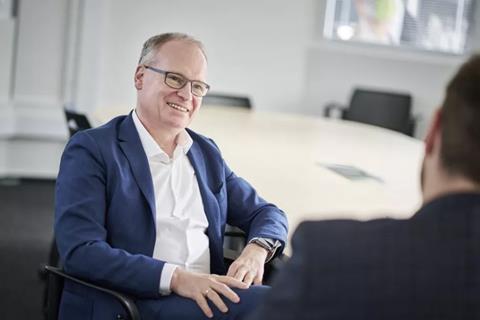
Hi Andreas. I have to ask… When did you last speak to your poredecessor, Michael Oeljeklaus?
Michael still lives in Prague, so we see each other occasionally. I’m always happy to meet him, but we never talk about work. The last time we saw each other was at the Skoda Klassik. Skoda organises this classic car rally annually for employees with historic vehicles of the brand. It was a great event with more than 200 participants and many spectators along the route. It’s impressive to see how firmly Skoda is anchored here in the region and how much enthusiasm our brand generates.
Philosophy and measures for Skoda production
Especially when there is a change in a management position, as an outsider you want to know what makes the successor tick. What is your philosophy in production?
The focus is currently clearly on digitisation and flexibility. We are in an enormous transformation process that affects not only the vehicles themselves, but also the processes in the factories. Digitisation, for example, is also about optimising the processes first and not just digitising existing, possibly inefficient processes. This is the only way we can achieve the efficiency that enables us to respond flexibly to current and future challenges and remain cost-effective. It is particularly important to take employees along with us, to get them excited about digitisation and, above all, to qualify them.
In your opinion, is it the wrong approach to completely convert factories to battery-electric vehicles?
The current situation is so volatile that it is difficult to make clear forecasts. Flexibility is crucial, and this applies not only to vehicle production but also to adapting to new models. It is important that our factories are able to handle changes efficiently and cost-effectively.
“A fundamental transformation such as the switch to electromobility is rarely a straightforward process in which one can clearly predict how quickly a new technology will prevail”
- Andreas Dick, Member of the Board, Production & Logistics, Skoda
Have you already made your own mark in terms of flexibility and digitalisation since you took office in September?
We have launched a number of initiatives, particularly in the area of digitalisation. At Skoda, we are already very innovative in production, and Michael (Oeljeklaus, editor’s note ) left me a very well-tended field. This year, we had to increase the momentum even further, for example through the increased use of camera systems and artificial intelligence. A lot is happening here at the moment.
The question about the near future is almost obligatory: What is currently at the top of your to-do list?
Our aim is to shape the transformation in such a way that the competitiveness of our locations is secured in the future. This is a top priority for me. We have a very high level of flexibility in our working regimes and have very good cooperation with our social partner. This must be maintained and expanded. In addition, we are preparing for new vehicle concepts and considering which new production processes - such as large-scale aluminum casting - we can use sensibly. Skoda has a high level of expertise in this area, which we want to rely on even more in the future.
Very few people know that aluminum die casting was invented here in Mladá Boleslav 60 years ago and was first used in engine block production. In the area of internationalisation, our focus is primarily on India, where Skoda is responsible for the activities of the Volkswagen Group and currently operates two plants. In my opinion, the Indian market has enormous potential.
Are there already concrete plans regarding megacasting? This is an innovation topic in which Tesla in particular has taken the lead.
Many competitors are currently focusing on this topic. We will look at this together within the Volkswagen Group and the potential for further cost reductions and efficiency improvements.
Electricity lull doesn’t scare Dick
When we talk about costs and efficiency, the discussion about the capacity utilisation of production sites is obvious, especially in the area of new drives. How worrying is it for you that the ramp-up of electromobility has stalled so much?
A fundamental transformation such as the switch to electromobility is rarely a straightforward process in which one can clearly predict how quickly a new technology will prevail. In addition, certain political decisions, such as the spontaneous termination of e-car subsidies in Germany, were not necessarily helpful and led to a certain amount of uncertainty among the population. For us, in production, this means that we not only have to be flexible in terms of vehicle variants, but a high level of working time flexibility is also important.
“There are numerous areas of application for artificial intelligence, for example intelligent camera systems for quality monitoring or self-learning neural networks for optimising logistics flows”
- Andreas Dick, Skoda
At our Mlada Boleslav site, for example, we have the advantage that combustion and electric models such as the Octavia, Enyaq and, in the future, Elroq are produced on the same line, which means we can flexibly control capacity utilisation. This of course helps to optimise factory costs, just like the lower wage costs. But it is at least as important that we can react quickly and flexibly to fluctuations in demand or supply bottlenecks in many places.
Mladá Boleslav is the first European location outside Germany that also manufactures MEB battery systems. In addition to combustion engines, BEVs also roll off the production line here. Are you currently satisfied with the electric vehicle utilisation?
We currently have an electric vehicle in our range, the Enyaq, which is selling very well. In September it was the best-selling electric car in Germany. We also recently introduced the Elroq, which we also have high hopes for. Overall, I am optimistic about the coming year. A lot depends on the economic and political conditions, and there are still some imponderables. However, for medium- to long-term planning, especially for us in production, we need clarity about where we are going. I think it is right to basically stick to the course we have chosen.
Insights from China help with the transformation
Currently, the growing importance of China in the global automotive game is increasingly being emphasised. You know China particularly well. What insights are you taking back to the Czech Republic?
In China, digitalisation is much more firmly anchored in everyday life. This is also evident in manufacturing, where digital solutions are used much more naturally. For example, it is completely normal for employees not to carry a factory ID card with them when they enter the factory, but to be identified via facial scanner. The affinity for digital tools in China is not only much greater in companies, but implementation is generally easier.
Read more Skoda stories
- Hyundai and Skoda sign MOU on hydrogen tech collaboration
- Škoda accelerates SUV innovation with second-generation Kodiaq launch in Kvasiny
- Kvasiny to become electromobility powerhouse
- Lowering costs through sustainable manufacturing
The openness to new things and the speed of implementation are impressive. This is one of the big differences to Europe. Here, change is often initially perceived as a risk, whereas in China or in Asia in general, change is seen more as an opportunity.
How easy is it to create an open mindset and a climate for creativity in automobile production, where many processes have been refined to near perfection over decades?
The production sector is the ideal playground for innovations, especially in the area of digitalisation. There are numerous areas of application for artificial intelligence, for example intelligent camera systems for quality monitoring or self-learning neural networks for optimising logistics flows. Our employees can learn and train such neural networks themselves using open source systems. And the enthusiasm for tackling this is growing, as everyone quickly realises how easy it is. Triggering this is a little faster in China than in Europe, but here too we are gaining more and more momentum and I see growing enthusiasm for these topics at Skoda too.
A major topic – not only in China – is the transformation to software-defined vehicles. How strong is the influence of new vehicle architectures on production processes?
New vehicle architectures, particularly the switch to central control units, offer great opportunities for production. These centralised systems, such as those used by Volkswagen’s new partner Xpeng, simplify production processes considerably. Commissioning becomes more efficient and wiring in the vehicle becomes less complex. This makes production more flexible and cost-effective overall.
How big is the AI impact in Skoda’s factories?
Back to the Smart Factory: Which field of innovation excites you most at the moment?
My personal hobbyhorse is artificial intelligence. It offers an incredible number of possible applications. In addition, the
The costs for such systems are currently falling sharply, while their performance is increasing enormously. This is particularly noticeable in the areas of process monitoring or error detection. We are already using these technologies on a large scale and the potential for the future is immense.
Can generative AI unleash completely different powers, especially in production?
I think so. The threshold that people have to overcome in order to be able to work with such systems will be much lower. This will significantly change work in production - and this is already happening with us today. For example, we have a use case in rework in which a large language model is trained in parallel to processing errors. This allows the system to give employees tips when similar error codes appear. This will raise the processes to a new level of efficiency in the future.
How do you train your employees in the use of new technologies?
Our employees are continuously trained. We have launched a special program to familiarise them with programming languages such as Python. This applies to both office employees and production employees. A maintenance engineer in bodyshop, for example, needs much more IT and AI know-how than an employee in administration these days. The boundaries between different areas of activity are becoming increasingly blurred and technical know-how is becoming more and more important in all areas. It is crucial that we take all employees along this path and inspire them to get involved in the new, digitalised world.
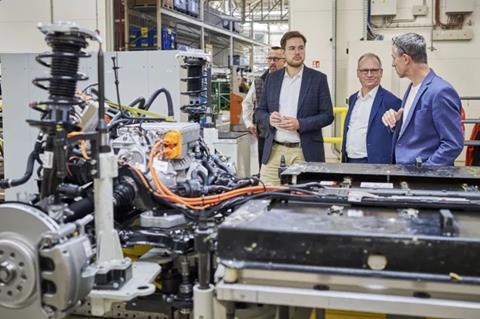
Skoda is in terms of tradition for the Czech Republic as important as, for example, Seat in Spain or Volkswagen for northern Germany. Do you see it as an advantage in Mladá Boleslav that you can assess this importance well? You were, among other things, plant manager in Emden.
Absolutely. Skoda has enormous appeal not only for Mladá Boleslav, but throughout the Czech Republic. The brand is deeply rooted in the country’s identity and people are proud to work at Skoda. Skoda is one of the oldest car manufacturers in the world and we will be celebrating our 130th anniversary next year. This tradition is an important part of the company’s identity and motivates the people who work here.
Will Skoda also produce other group brands in the future?
In the recent past, there has been an increasing number of multi-brand production in Volkswagen Group plants. What is your opinion on this concept?
The joint production of vehicles that are technically related makes absolute sense. We are already doing this, for example with the Superb and the VW Passat in Bratislava or the Karoq and the Seat Cupra Ateca in Kvasiny. Using these synergies makes a lot of sense from a manufacturing point of view and helps to reduce costs. I also pushed this forward during my time at FAW-Volkswagen, where related VW and Audi models are now manufactured together in all plants.
Will we see this here in Mladá Boleslav too, for example in MEB-based corporate models?
This is not planned in the context of the current occupancy. However, if it makes sense in the future from a synergy perspective, we are of course very open to it.
What is the status of the plan to build your own battery cell factory in the Czech Republic?
The plan to build a battery cell factory has been put on hold for the time being. Due to the current volumes of BEVs, the requirements is covered by existing factories. We are focusing on expanding our production capacities for battery systems.
In the future, Skoda factories will be brewing their own sustainable coffee. What sounds like a marketing gimmick actually has a solid manufacturing background: the shells of coffee beans are used as a waste product for tanning seat leather. What other ideas do you have in mind when we talk about circularity and sustainability at Skoda?
A major project we are currently working on is converting our power plant in Mladá Boleslav to carbon neutrality. By 2027, we want to convert the power plant, which supplies energy and heat not only to our site but also to the city and the surrounding area, to renewable raw materials such as wood and phytopellets. We also get electricity from our own wind farm and from solar panels on our buildings and are increasingly using biogas. Of course, we are also ambitious in many other areas to make our production sustainable.
In person:
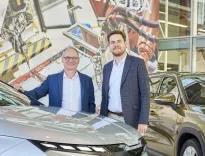
Andreas Dick joined the Volkswagen Group in 1998 after studying manufacturing engineering at the Technical University of Braunschweig. The graduate engineer worked as head of body construction at Volkswagen de Mexico and in plant management at the FAW-Volkswagen plant in Changchun before being responsible for setting up the plant in Foshan in 2011 and subsequently taking over plant management there.
From 2016 to 2019, he headed the VW plant in Emden, where he was responsible for the launch of the Passat and Arteon, among other things. Most recently, he was Technical Vice President at FAW-Volkswagen in Changchun since 2019, where he was responsible for production, logistics, planning
Sand technical development, among other things. Dick has been Board Member for Production and Logistics at Skoda Auto since September 2023.





























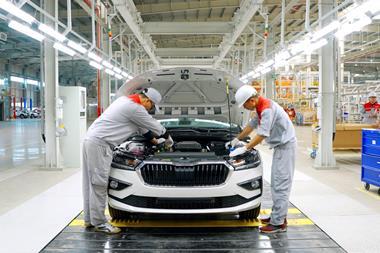

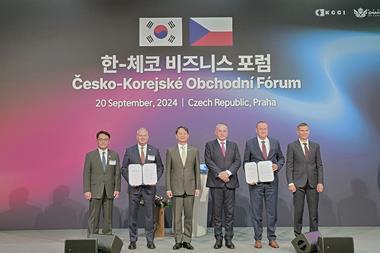
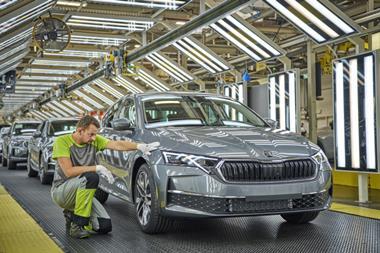
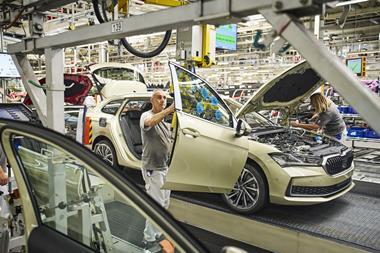
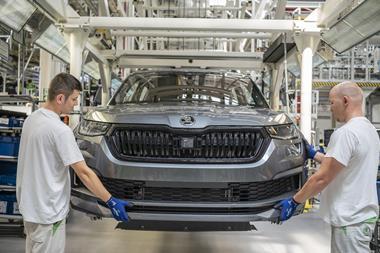



No comments yet